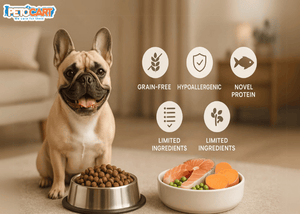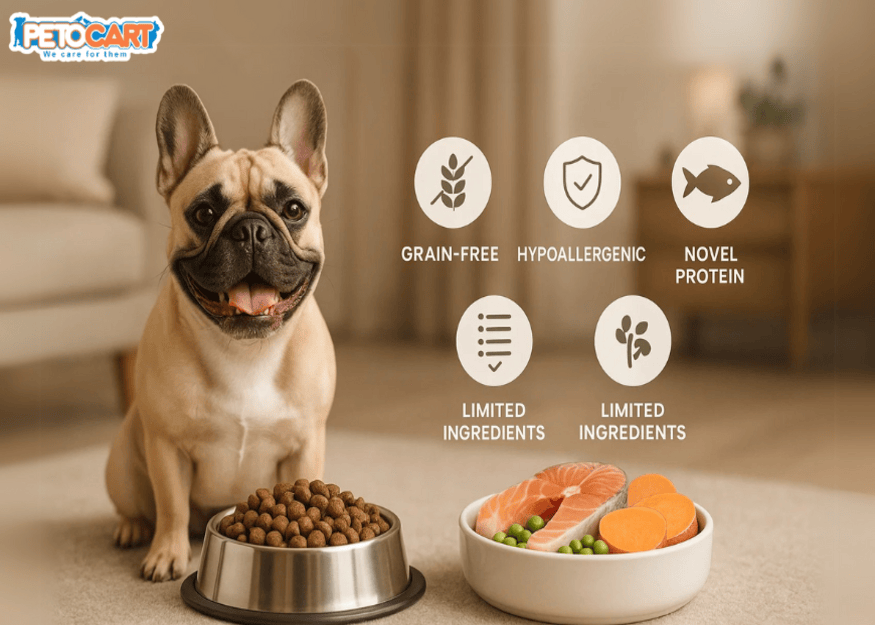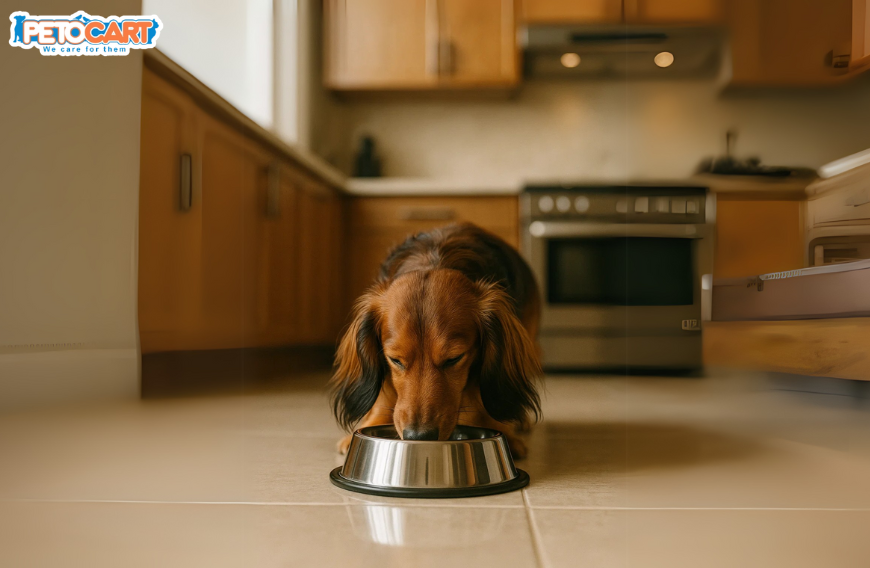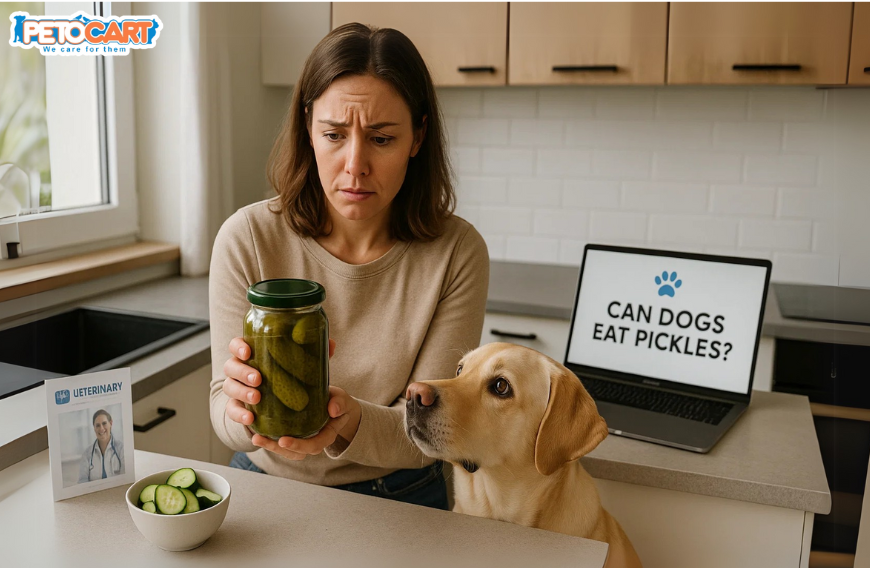As a devoted dog parent, sharing snacks with your furry buddy feels natural. That tangy crunch of a pickle might seem like an intriguing treat to offer. But is it really safe for your dog to nibble on pickles?
This guide breaks down everything you need to know about feeding pickles to dogs—what’s in them, the potential health risks, and better treat choices. We’ve gathered insights from vets and pet nutrition pros to help you make the best decisions for your pup’s health and happiness.
Are Pickles Safe for Dogs?
Short answer: Pickles aren’t poison for dogs, but they’re usually not a good idea.
Here’s why:
-
Very high in salt: Too much sodium can seriously throw off your dog’s balance of electrolytes, leading to health issues
-
Risky ingredients: Many pickles contain garlic, onions, spices, and preservatives—all of which can upset your dog’s stomach or even be toxic
So, while your dog won’t get poisoned by a bite or two, pickles aren’t exactly a healthy snack for them.
What’s Inside Pickles? Ingredients Your Dog Should Avoid
Pickles vary a lot depending on the recipe. That makes feeding them to your dog a bit of a gamble unless you check the label carefully. Here are the main culprits to watch out for:
| Ingredient | Why It's Bad for Dogs |
| Garlic | Damages red blood cells, can cause anemia |
| Onions | Like garlic, toxic even in small amounts |
| Spicy Peppers & Strong Spices | Irritate your dog’s digestive system, causing vomiting and diarrhea |
| Sugars & Preservatives (esp. xylitol) | Xylitol is highly toxic; sugar can cause digestive upset |
| High Salt (Sodium) | Leads to excessive thirst, vomiting, seizures |
Sodium Alert
Dogs do need some sodium—tiny amounts—to stay healthy. The Association of American Feed Control Officials (AAFCO) recommends around 0.3% in their food. But the problem is that even a small helping of pickles pushes your dog well over the safe limit of about 100 mg per day (for a medium-sized dog).
Too much salt can cause:
-
Increased thirst and frequent urination
-
Nausea and vomiting
-
Diarrhea
-
Seizures and coordination problems
If your dog already has heart, kidney, or blood pressure issues, salty snacks can be especially dangerous.
What About Pickle Juice?
Pickle juice is even saltier than the pickles themselves and can have those same harmful spices or additives.
If your dog accidentally laps up pickle juice, don’t wait. Call your vet right away—quick treatment could prevent serious salt poisoning.
Do Pickles Offer Any Benefits for Dogs?
Pickles keep some of the good stuff found in cucumbers, like vitamin K and antioxidants. But honestly, these benefits get totally overshadowed by the risks of salt, sugar, and toxic spices.
That said, there’s one bright spot:
-
Fresh dill herb, often found in dill pickles, is safe for dogs and even good for them. Dill has antioxidants and anti-inflammatory qualities that can support your pup’s health.
Pro tip: Instead of handing over dill pickles, sprinkle a little fresh dill on your dog’s food for flavor and health perks.
Better, Safer Alternatives to Pickles
If you want to treat your dog to something crunchy and cool, plain cucumbers are the way to go.
Why cucumbers make a great dog snack:
-
Low in calories and salt
-
Packed with water to keep your dog hydrated
-
Full of vitamins and minerals that support health
-
Gentle on the stomach and easy to digest
You can also add small amounts of fresh herbs like dill to your dog’s meals for extra flavor and nutrients.
What Do Veterinarians Say?
Most vets agree: It’s best to skip pickles altogether. The risks usually just aren’t worth it.
-
Dr. Carly Fox points out that the salt and additives in pickles can harm your dog’s health
-
Dr. Lucas White warns about garlic and onions in pickles, which can cause serious poisoning
-
Trusted pet groups like the ASPCA and MetLife Pet Insurance also recommend avoiding salty human snacks
Before sharing any new “people food,” especially something like pickles, chat with your vet. They’ll help you decide what’s safe based on your dog’s unique needs.
What To Do If Your Dog Eats Pickles or Pickle Juice
Keep an eye out for signs like:
-
Drinking or peeing a lot more than usual
-
Throwing up or having diarrhea
-
Acting weak or unusually tired
-
Experiencing seizures or seeming wobbly
If your dog shows any of these symptoms or gobbles a large amount of pickles or pickle juice, get them to the vet as soon as possible.
Quick Recap: Can Dogs Eat Pickles?
|
Aspect |
What You Should Know |
|
Are Pickles Toxic? |
No, but they can harm your dog due to salt and additives |
|
Main Dangers |
Too much salt, toxic garlic/onion, stomach upset |
|
Possible Health Issues |
Vomiting, diarrhea, seizures, anemia |
|
Safer Treat Ideas |
Plain cucumbers, fresh dill |
|
Vet Advice |
Avoid pickles; check with your vet before trying new treats |
|
Emergency |
Call your vet immediately if your dog eats a lot or shows symptoms |
Final Thoughts
Your dog may stare longingly at your pickle, but it’s safer to keep that tangy crunch to yourself. Instead, spoil your furry friend with fresh cucumbers or a little fresh dill sprinkled on their food. Always put your dog’s health first and check with your vet before sharing any new human food.
By staying informed, you’ll make sure your best friend enjoys treats that are both tasty and safe.
Frequently Asked Questions (FAQs)
Q1: Can dogs eat dill pickles?
A: Dill pickles usually have too much salt, spices, and sometimes garlic. It’s better to give your dog fresh dill herb instead.
Q2: How much sodium is safe for my dog?
A: It depends on your dog’s size and health, but about 100 mg per day is a rough safe maximum for a medium-sized dog.
Q3: What if my dog accidentally ate a small piece of pickle?
A: A tiny nibble probably won’t hurt, but watch for any weird behavior or tummy trouble and don’t feed more.
Q4: Are other pickled foods safe?
A: Most pickled foods are salty and have spices or additives that aren’t good for dogs, so it’s best to avoid them.








